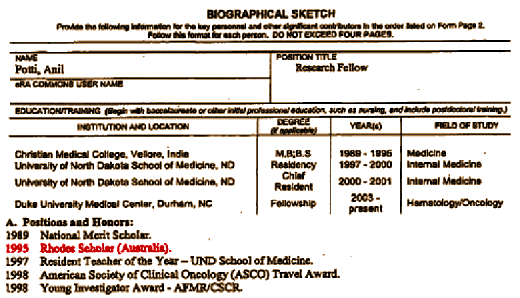Prominent Duke Scientist Claimed Prizes He Didn’t Win, Including Rhodes Scholarship
The Cancer Letter
By Paul Goldberg
July 16, 2010A high-profile cancer genomics researcher at Duke University claimed in multiple grant applications that he had been a Rhodes scholar, when, in fact, the Rhodes Trust states flatly that he was not. Documents obtained by The Cancer Letter show that in biographies submitted to NIH, Duke oncologist and genomics researcher Anil Potti claimed variously to have won the prestigious scholarship in 1995 or 1996, depending on the version of the biography. Potti also made the Rhodes claim in an application that resulted in a $729,000 grant from the American Cancer Society. “We don’t have any record that Anil Potti was a Rhodes scholar,” a spokesman for the Rhodes Trust said to The Cancer Letter.
Questions about Potti’s credentials seem consistent with the trail of errors acknowledged by his prominent and well-funded research group, whose work has been published in top-tier journals, including the New England Journal of Medicine and Nature Medicine. This body of work has brought in millions of dollars in funding from the federal government and private sources, but has been marred by corrections and even corrections of corrections…
Updated: Anil Potti, Duke Cancer Researcher Accused of Misconduct, Resigns
More research to be retracted
The Chronicle [Duke]
By Zachary Tracer and Taylor Doherty
November 19, 2010Updated 6:30 p.m. with comments from Dr. Anil Potti, IGSP Director Huntington Willard and Dr. Michael Cuffe, DUHS vice president for medical affairs.
The Duke cancer researcher who has been under investigation for research misconduct since this summer has resigned. Dr. Anil Potti stepped down from his positions at Duke’s Institute for Genome Sciences and Policy and the School of Medicine Friday and took sole responsibility for the problems in his research, IGSP Director Huntington Willard said. Potti had been on paid administrative leave since this summer. “This is obviously a very regrettable series of events at all kinds of levels,” Willard said in an interview Friday.
Potti’s resignation comes after the termination of clinical trials based on his research and the retraction of a key paper he authored. The terminations and retractions occurred because Duke no longer had confidence in the research underlying them. In resigning, Potti took responsibility for the problems that undermined this research.
In an e-mail, Potti did not discuss details of his resignation. “It has been a difficult time, as you might imagine,” he wrote. He said Willard’s message to IGSP staff “summarized things well.” “[Potti] accepted full responsibility for a series of anomalies in data handling, analysis and management that have come under scrutiny in the past months,” Willard wrote in an e-mail to IGSP staff…
When I read the paper, the science part is opaque to me, as it probably would be to most. Gene maps are a recent addition to the medical research world, and his statistics are unknown to me [though that’s an area I know something about]. My point is that a critical reading of this paper would require knowledge only a fairly limited number of people on the planet might have. But I understand the conclusion – a test that would accurately predict responsiveness to a toxic drug would alleviate a lot of needless suffering and might point non-responders-to-be to other drugs or treatments. That’s a lot. Moreover, it would be an early clinical use of all the recent research on the human genome.
But to the point, it was worth a lot of money to the Duke Medical School. The Grant from the National Cancer Institute for this clinical project alone was near $700 thousand.

It took the exposure of his r̩sum̩ padding to get people to sit up and take notice of his science and finally retract the study and shut down the clinical follow-up. Until then, Duke bent over backwards to press forward even though there were a lot of questions. Likewise, in the example I cite so often, Dr. Nemeroff was busted for infractions Рconflict of interest problems Рbefore the shakiness of his science was ever directly addressed.
I was reminded of what a career criminal once said to me. "You’re lucky that we’re so damned dumb," he laughed. "We always think we can get away with it and make some really stupid mistake that gets us caught." Is it fair to equate these medical cases with such a person? Sure, in my book. Like the armed robber, they think they can "get away with it." Fudge on your resume. Fudge on your research. Never-mind that it’s all bound to come crashing down at some point. The overstated credentials will be revealed. The fudged conclusion is going to be proven wrong somewhere down the line. The off-label use of a dangerous drug is going to start causing problems sooner or later – just like the armed robbery is going to misfire sooner or later.
I guess we are lucky that such moral failings are usually chronic and pervasive. The résumé padder is the data manipulator. The drug company shill is the expert at getting big grants for small ideas. And they keep doing it because they "got away with it." I know that with Dr. Nemeroff, almost anyone who met him would think that there’s something fishy. I’d bet money that the same thing was true of Dr. Botti. We overlook the small signs along the way, then reap the misery later. When the story is finally out there, one is rarely really surprised.

Sorry, the comment form is closed at this time.